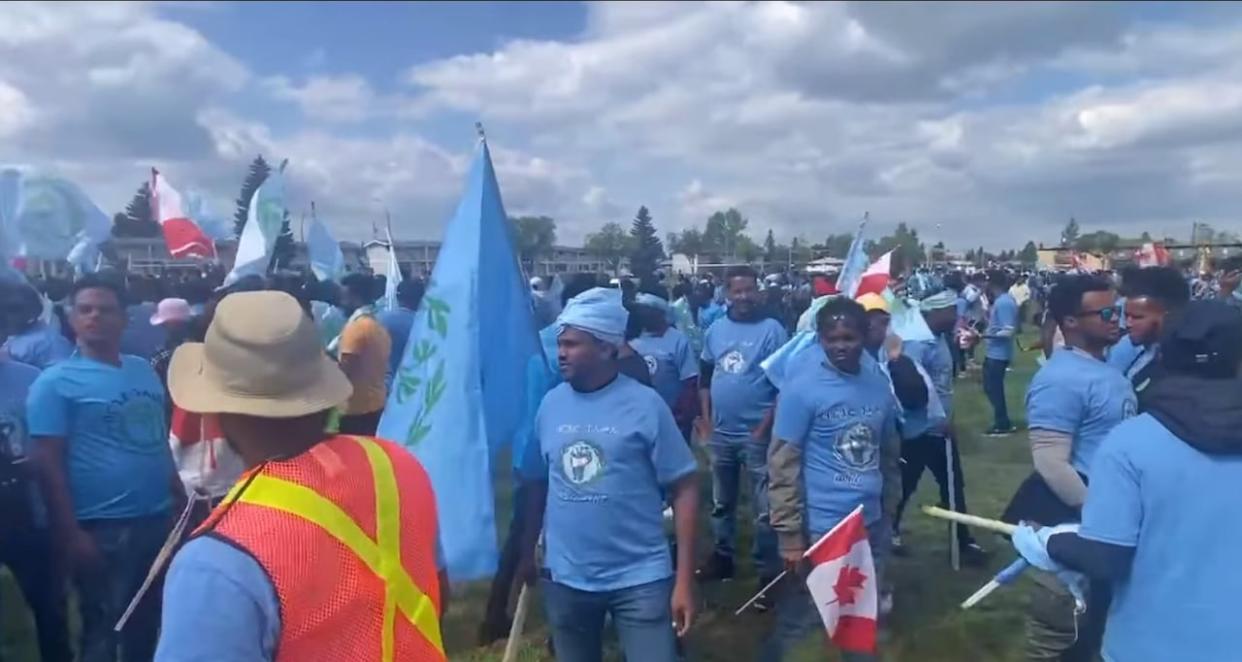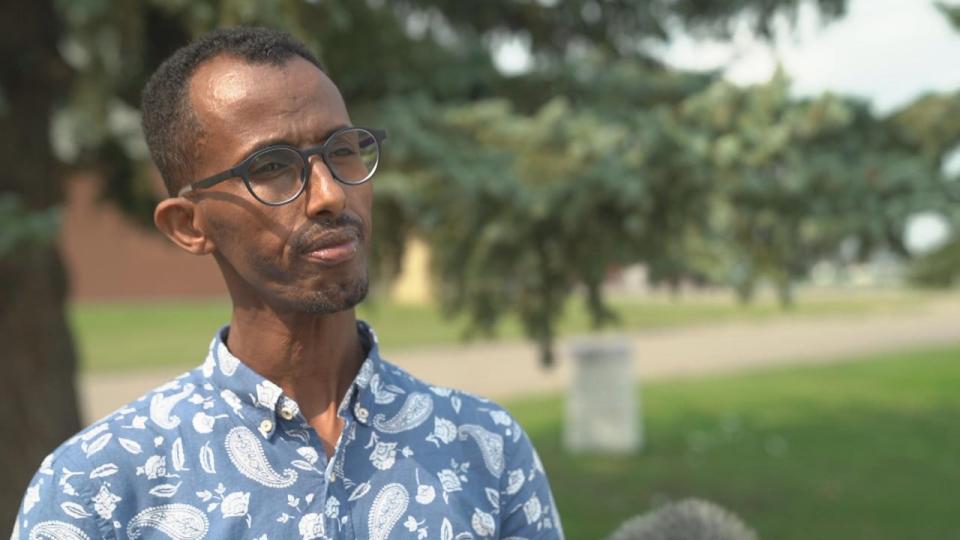Why Eritreans in Canada are clashing at festivals

Violence broke out at an Eritrean festival in Edmonton this weekend following a similar clash in Toronto earlier this month.
At both events, protesters from the Eritrean diaspora opposed events that billed themselves as celebrations of Eritrean culture.
Protesters say the festivals are connected to the Eritrean government, distributing propaganda and raising money for the state. They view demonstrations as a chance to raise their voice in opposition to a repressive regime when those in their home country cannot.
Lambros Kyriakakos, chair of the national Coalition of Eritrean Canadian Communities and Organizations who co-organized the festivals in Edmonton and Toronto, disagrees with characterizing the celebrations as ideological or pro-government.
"This festival has been running for 40 years and has been always a gathering, celebration of friendship, culture, identity, pride of identity for the new generation, connection to homeland and connection to the wider community," he said in an interview Tuesday.
"We might be political because we want to respond to the unfairness of the injustice of the 150 years of occupation and colonization. In that sense, you can say, yes, we are politically patriotic."
Kyriakakos said fundraising is not the core purpose of the festivals but that any money raised goes toward helping victims of war and alleviating poverty.
He said such festivals date back to the 1970s, when the east African country first sought self-rule.
Eritreans fought a brutal war for independence against Ethiopia for decades before finally establishing the current state in 1993.
Isaias Afwerki has led the one-party authoritarian government, sometimes referred to as the North Korea of Africa, since independence, and has been criticized for human rights abuses.
Kyriakakos ascribes the recent opposition in Edmonton and Toronto as the result of changing geopolitics in the Horn of Africa but declined to elaborate, instead criticizing the violence that had erupted.
"We see the paradoxical message that they are passing in the name of human rights. They are saying that they have the right to harm their own people."
Tigray war
From 2020-2022, Eritrea allied itself with Ethiopia against a paramilitary group in the Tigray region. The two-year war counted victims in the hundreds of thousands.
Misghina Tewahso, one of the organizer's of Saturday's protest, said in an interview Monday that long-simmering anger among the diaspora reached a boiling point because of the conflict.
Many Eritreans died in the war but their fates remain unknown to loved ones.
"Because we keep contact to our loved ones back home. What they tell us is just pain."

Misghina Tewahso, one of the organizer’s of Saturday’s protest, said the demonstration's intention was peaceful. (Manuel Carrillos Avalos/CBC)
Tewahso has lived in Edmonton for 11 years after fleeing the country. He said many of the protesters have similar stories and that escaping the country is dangerous — many die making the effort.
"Even I'm here in Canada peacefully but I will never let these government supporters do funding for this government, collect money and do propaganda, advocate for this very cruel government.
"Because of my morals, I will never let this happen."
Tewahso said protesters wear light blue shirts in a nod to the Eritrean flag from 1952-1959 before it was annexed by Ethiopia.
Violence in Edmonton
According to the Edmonton Police Service, officers attended a demonstration for an Eritrean festival scheduled to take place in the city's west side. Following discussion with both parties and rising tensions, the police and the City of Edmonton withdrew the festival permit.
Around 11 a.m., police attended 132nd Avenue and 113A Street after reports the festival and demonstrators had moved to that location. Organizers had also planned a youth soccer tournament to take place there.
Fighting broke out in the field adjacent to Rosslyn School.
Police said one person was assaulted with an object and taken to hospital with non-life-threatening injuries. Ten others later reported to hospital with minor injuries. One officer required stitches after being hit with a projectile thrown by a demonstrator.
No arrests have been made. Edmonton police read the Riot Act as part of their response, the first time since Canada Day in 1999.
Both sides say the other started the violence.
Kyriakakos said festival attendees moved to the second location because protesters were not allowing participants to enter.
Tewahso said protest organizers made every effort to alert police and the city of their intentions, which were peaceful.
"It's so unfortunate that things got out of control, then fight [broke out]. Luckily, the police arrived and make it safe."
Zeraslasie Shiker is a former Eritrean diplomat who came to the United Kingdom as an asylum seeker in 2008. He is now a PhD candidate at the University of Leeds studying diaspora political activism.
He said although Eritrean cultural festivals have been happening worldwide for decades, many have been hijacked by the state to spread its message and raise funds.
Shiker said the government portrays opposition as non-Eritrean or as agents of the Tigray People's Liberation Front. Earlier this month, the country's information minister posted on social media about the disruptions.
"Complicity in attempts to disrupt decades-old Eritrean festivals using foreign thugs reflects abject failure of asylum scum," he said. He later criticized the "distorted portrayal" of the community's "joyous events."
Shiker views the protests that have been disrupting these events worldwide as a natural evolution of political opposition to the Eritrean state among the diaspora.
"These people are struggling to connect the struggle here in Eritrea by disrupting the transnational institutions of the totalitarian state.
"And that is how you really need to see the local to global connections of these movements."


